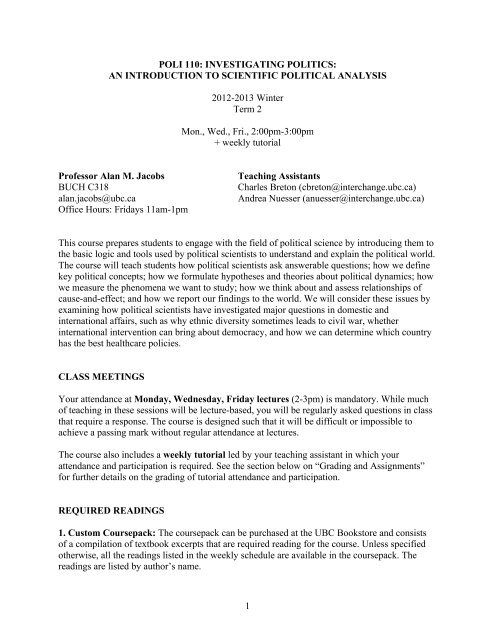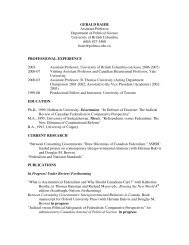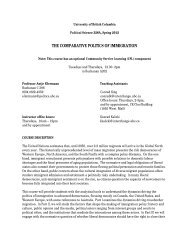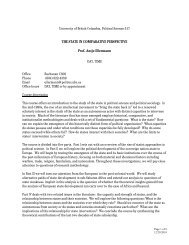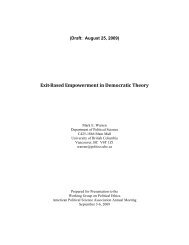Spring 2013 syllabus - Political Science, Department of
Spring 2013 syllabus - Political Science, Department of
Spring 2013 syllabus - Political Science, Department of
You also want an ePaper? Increase the reach of your titles
YUMPU automatically turns print PDFs into web optimized ePapers that Google loves.
POLI 110: INVESTIGATING POLITICS:<br />
AN INTRODUCTION TO SCIENTIFIC POLITICAL ANALYSIS<br />
2012-<strong>2013</strong> Winter<br />
Term 2<br />
Mon., Wed., Fri., 2:00pm-3:00pm<br />
+ weekly tutorial<br />
Pr<strong>of</strong>essor Alan M. Jacobs<br />
BUCH C318<br />
alan.jacobs@ubc.ca<br />
Office Hours: Fridays 11am-1pm<br />
Teaching Assistants<br />
Charles Breton (cbreton@interchange.ubc.ca)<br />
Andrea Nuesser (anuesser@interchange.ubc.ca)<br />
This course prepares students to engage with the field <strong>of</strong> political science by introducing them to<br />
the basic logic and tools used by political scientists to understand and explain the political world.<br />
The course will teach students how political scientists ask answerable questions; how we define<br />
key political concepts; how we formulate hypotheses and theories about political dynamics; how<br />
we measure the phenomena we want to study; how we think about and assess relationships <strong>of</strong><br />
cause-and-effect; and how we report our findings to the world. We will consider these issues by<br />
examining how political scientists have investigated major questions in domestic and<br />
international affairs, such as why ethnic diversity sometimes leads to civil war, whether<br />
international intervention can bring about democracy, and how we can determine which country<br />
has the best healthcare policies.<br />
CLASS MEETINGS<br />
Your attendance at Monday, Wednesday, Friday lectures (2-3pm) is mandatory. While much<br />
<strong>of</strong> teaching in these sessions will be lecture-based, you will be regularly asked questions in class<br />
that require a response. The course is designed such that it will be difficult or impossible to<br />
achieve a passing mark without regular attendance at lectures.<br />
The course also includes a weekly tutorial led by your teaching assistant in which your<br />
attendance and participation is required. See the section below on “Grading and Assignments”<br />
for further details on the grading <strong>of</strong> tutorial attendance and participation.<br />
REQUIRED READINGS<br />
1. Custom Coursepack: The coursepack can be purchased at the UBC Bookstore and consists<br />
<strong>of</strong> a compilation <strong>of</strong> textbook excerpts that are required reading for the course. Unless specified<br />
otherwise, all the readings listed in the weekly schedule are available in the coursepack. The<br />
readings are listed by author’s name.<br />
<br />
1
2. Readings Available Electronically: As listed below in the detailed <strong>syllabus</strong>, some required<br />
readings for the course are electronically available either on the Course Website (see section<br />
below on the Course Website), through the UBC Library Online Catalogue, or simply through<br />
a link on the web. It is your responsibility to download all readings from the appropriate<br />
location.<br />
GRADING AND ASSESSED COURSE WORK<br />
A. In-Class Written Assessment<br />
1. Quiz 1, Feb. 8 in Class. This quiz will assess material covered in Weeks 1 through 4<br />
and will be worth 15% <strong>of</strong> your overall mark.<br />
2. Quiz 2, March 11 in Class. This quiz will assess material covered in weeks upto and<br />
including Week 8 and will be worth 15% <strong>of</strong> your overall mark.<br />
3. Final Exam (Date and Time to be Set by Registrar). The Final Exam will be<br />
cumulative and will be worth 20% <strong>of</strong> your overall grade.<br />
B. Tutorial Attendance and Participation<br />
Attendance and active participation in the weekly tutorial led by your teaching assistant is<br />
required and will be worth a total <strong>of</strong> 20% <strong>of</strong> your overall grade. You will be allowed one<br />
unexcused absence from tutorial during the term.<br />
In general, tutorials will address and expand upon the topic that was covered the previous week<br />
in lecture. Prior to each tutorial, you must have carefully read all required readings for the<br />
previous week’s topic and completed any “tutorial prep.”<br />
C. Written Assignments (Take-home)<br />
You will complete 7 written assignments outside <strong>of</strong> class. Further guidance on all assignments<br />
will be provided in lecture and in tutorial. All assignments are to be uploaded to the Course<br />
Website by the indicated due date. The schedule <strong>of</strong> deadlines for assessed work is in the table<br />
below. The 7 assignments are comprised <strong>of</strong>:<br />
1. Three “major assignments,” each worth 6% <strong>of</strong> your overall grade (18% total).<br />
3. Four written “tutorial preps,” each worth 3% <strong>of</strong> your overall grade (12% total).<br />
<br />
2
Assignment<br />
KEY TO ASSESSED COURSE COMPONENTS<br />
Date/<br />
Due Date<br />
Percentage<br />
<strong>of</strong> Overall<br />
Grade<br />
Tutorial attendance and Weekly (Weeks 2-13) 20%<br />
participation<br />
Major Assignment 1:<br />
Jan. 21, noon 6%<br />
“Types <strong>of</strong> Claims”<br />
Tutorial Prep 1 Jan. 28, noon 3% (Pass/Fail)<br />
Tutorial Prep 2 Feb. 4, noon 3% (Pass/Fail)<br />
Quiz 1 Feb. 8, in class 15%<br />
Major Assignment 2:<br />
March 4, noon 6%<br />
“Measurement”<br />
Quiz 2 March 11, in class 15%<br />
Major Assignment 3:<br />
March 18, noon 6%<br />
“Measurement”<br />
Tutorial Prep 3 March 25, noon 3% (Pass/Fail)<br />
Tutorial Prep 4 April 3, noon 3% (Pass/Fail)<br />
Final Examination<br />
Exam Period, Date and Time to be Set<br />
by Registrar<br />
20%<br />
LATE ASSIGNMENTS AND MISSED EXAMINATIONS<br />
Late assignments are strongly discouraged and will incur penalties except in the event <strong>of</strong> a<br />
documented serious illness or serious personal emergency.<br />
For assignments that are to receive a mark (i.e., not pass/fail), the penalty for a late assignment<br />
will be a deduction <strong>of</strong> 2 percentage points from the assignment mark for each day that the<br />
assignment is not handed in. Assignments handed in over a week late will not be graded. If the<br />
assignment is handed in on the due date, but after the specified time, the first deduction will be<br />
assessed on that date, and an additional deduction <strong>of</strong> 2 points will be assessed for each additional<br />
day that the assignment is not handed in.<br />
For assignments to be graded pass/fail, the penalty for a late assignment will be a deduction <strong>of</strong> 1<br />
percentage point (out <strong>of</strong> 3 points total) for each day that the assignment is not handed in.<br />
Assignments handed in over a week late will not be graded.<br />
<br />
3
Missed quizzes or examinations will result in a grade <strong>of</strong> zero except in the event <strong>of</strong> a<br />
documented illness or emergency.<br />
Students who need additional time for an assignment for a medical or serious personal reason<br />
must contact the Teaching Assistant before the due date and as soon as the problem arises.<br />
Requests for accommodation made after an assignment’s due date will not generally be<br />
considered. Some documentation, such as a doctor’s note, will usually be required to make<br />
accommodation. Please note that extensions will not be made for foreseeable circumstances,<br />
such as having multiple papers due in the same week. Extensions are reserved for<br />
unforeseeable events that are outside a student’s control (e.g., illness, a death in the family).<br />
When you know <strong>of</strong> such situations ahead <strong>of</strong> time, it is your responsibility to organize your work<br />
for this course so that you can turn in the assignment on time.<br />
Extensions will usually not be granted for work lost due to computer crashes or the loss <strong>of</strong><br />
a computer file. The reason for this is that there are simple and free ways <strong>of</strong> regularly and<br />
automatically backing up your work. It is recommended that all students subscribe to an<br />
automatic online backup service (many <strong>of</strong> which are free). These services will ensure that your<br />
files are backed up to a remote server at least once a day. Thus, even if your computer dies, there<br />
is no reason you should not be able to retrieve a quite current copy <strong>of</strong> your work.<br />
If you have any prior commitments that would prevent you from carrying out any required<br />
course assignments on schedule, you should discuss these with the course instructor well in<br />
advance <strong>of</strong> the course drop date to see if your scheduling conflict can be accommodated.<br />
Read the university calendar so that you are aware <strong>of</strong> no-penalty drop dates, requirements for<br />
medical authorization (to defer an exam, for example) and other procedures that may affect you:<br />
http://www.calendar.ubc.ca/vancouver/index.cfmtree=3,48,0,0<br />
Grading in this course will follow the UBC Faculty <strong>of</strong> Arts guidelines. Please refer to the<br />
following link for information on these guidelines:<br />
http://www.arts.ubc.ca/faculty-amp-staff/resources/courses-and-grading/grading-guidelines.html<br />
CHEATING AND PLAGIARISM<br />
Academic dishonesty in the form <strong>of</strong> cheating or plagiarism will not be tolerated. The University<br />
considers plagiarism to be the most serious academic <strong>of</strong>fence that a student can commit.<br />
Plagiarism includes but is not limited to the presentation or submission <strong>of</strong> the work <strong>of</strong> another<br />
person, without citation or credits, as the student's own work. Whether intentional or accidental,<br />
instances <strong>of</strong> plagiarism will have serious academic consequences.<br />
In my experience, many students who believe they know what plagiarism is do not actually have<br />
a clear understanding <strong>of</strong> where the line between proper and improper use <strong>of</strong> sources lies. I thus<br />
<br />
4
strongly encourage you to read the UBC library’s excellent online resources at<br />
http://learningcommons.ubc.ca/guide-to-academic-integrity/.<br />
If you have any doubts about how and when to properly acknowledge another person’s work,<br />
please discuss these with the course instructor.<br />
Punishment for cheating or plagiarism will include a grade <strong>of</strong> zero and other disciplinary action.<br />
Please refer to the University policies on cheating and plagiarism for examples <strong>of</strong> what<br />
constitutes academic misconduct and the extent <strong>of</strong> disciplinary action that could be taken.<br />
http://www.calendar.ubc.ca/vancouver/index.cfmtree=3,0,0,0<br />
COMMUNICATION WITH TEACHING STAFF<br />
For any questions or concerns about the course as a whole, please contact the course instructor<br />
via e-mail or stop by my <strong>of</strong>fice hours. Any questions about the material covered in lectures<br />
should also be directed to me. Questions about the tutorial should be directed to your TAs:<br />
Charles Breton (cbreton@interchange.ubc.ca) or Andrea Nuesser<br />
(anuesser@interchange.ubc.ca). Your TAs will also hold regular <strong>of</strong>fice hours and further<br />
information will be provided in tutorial.<br />
Emails with course announcements, details on required readings and other important information<br />
will <strong>of</strong>ten be sent to registered students via the Student Services system. It is your responsibility<br />
to make sure that the email address you have registered with UBC is valid and to check your<br />
email at this address regularly so that you do not miss these announcements.<br />
COURSE WEBPAGE AND EMAIL<br />
There is a course webpage for POLI 110 on UBC’s Connect System. You can log in at<br />
www.connect.ubc.ca with your CWL username and password. I will use this page to<br />
communicate important course information and to post various course documents (readings,<br />
<strong>syllabus</strong>, lecture slides etc.) throughout the term. You will also be instructed to use this system to<br />
upload your written assignments.<br />
<br />
5
COURSE SCHEDULE, READINGS<br />
AND TUTORIALS<br />
PART I: INTRODUCTION TO SOCIAL SCIENCE<br />
Week 1 (January 4 th ): Course structure, requirements, objectives<br />
No Tutorial<br />
Week 2 (Jan. 7, 9, 11): What is Social <strong>Science</strong><br />
Reading<br />
Neuman, pp 2-7 in Course Package<br />
Tutorial Topic<br />
Introduction<br />
PART II: CAUSALITY IN THE SOCIAL SCIENCES<br />
Week 3 (Jan. 14, 16, 18): Types <strong>of</strong> Questions and Claims (Prescriptive/Descriptive/Causal)<br />
Reading<br />
(1) “Distinguishing between Normative and Empirical Statements”<br />
http://www.politicalscience.uncc.edu/godwink/POLS2220/2%20Normative%20a<br />
nd%20empirical%20statements.pdf<br />
Tutorial Topic<br />
Types <strong>of</strong> Claims<br />
Week 4 (Jan. 21, 23, 25): Types <strong>of</strong> Causal Arguments<br />
<br />
6
Reading<br />
(1) “General and Specific Knowledge in the Social <strong>Science</strong>s”: On Course Website<br />
Tutorial Topic:<br />
Discussion <strong>of</strong> types <strong>of</strong> claims<br />
Week 5 (Jan. 28, 30, Feb. 1): Types <strong>of</strong> Causal Arguments (continued)<br />
Reading<br />
(1) “Causality: Counterfactuals, Deterministic Claims, and Probabilistic Claims”: On<br />
Course Website<br />
(2) For Next Week’s Tutorial - Wikipedia entry: Causes <strong>of</strong> the French Revolution<br />
(3) For Next Week’s Tutorial - Wikipedia entry: Russian Revolution<br />
Tutorial Topic<br />
Discussion <strong>of</strong> Causes: Obama-Romney Election<br />
Week 6 (Feb. 4, 6, 8): Causal Logics<br />
Feb. 8: Quiz Covering Material up to and Including Week 4<br />
Reading<br />
(1) “Causal Logics”: On Course Website<br />
(2) For next week’s tutorial: Rwanda: How the Genocide Happened<br />
(http://news.bbc.co.uk/2/hi/1288230.stm)<br />
Tutorial Topic<br />
Causes <strong>of</strong> Revolutions<br />
<br />
7
PART III: STUDYING CAUSALITY EMPIRICALLY<br />
Week 7 (Feb. 13, 15): Introduction to Measurement<br />
Reading:<br />
(1) Johnson and Joslyn, pp. 49-53 in Course Package<br />
(2) Hoover and Donovan pp. 18-24 in Course Package<br />
Tutorial Topic:<br />
Extracting Causal Logics, Questionnaire Design<br />
Week 8 (Feb. 25, 27, March 1): Challenges <strong>of</strong> Measurement<br />
Reading:<br />
(1) Manheim and Rich: pp. 91-95 in Course Package<br />
(2) “Measurement Error”: On Course Website<br />
Tutorial Topic:<br />
Discussion <strong>of</strong> Measurement 1<br />
Week 9 (March 4, 6, 8): Variables and Hypotheses, Covariation as a Means <strong>of</strong> Assessing<br />
Causation<br />
Reading:<br />
(1) Hoover and Donovan, pp. 24-27;<br />
(2) Manheim and Rich, pp. 27-30;<br />
(3) Johnson and Jocelyn, pp. 27-30.<br />
Tutorial Topic<br />
Discussion on Measurement 2<br />
<br />
8
Week 10 (March 11, 13, 15): Covariation as a Means <strong>of</strong> Assessing Causation (continued),<br />
Statistical Significance<br />
March 11: Quiz Covering Materials up to and including Week 8<br />
Reading:<br />
(1) White, pp. 61-65<br />
Tutorial Topic<br />
Developing Hypotheses<br />
Week 11 (March 18, 20, 22): Spurious Causation (Types <strong>of</strong> Spuriousness and Solutions)<br />
Reading:<br />
(1) Neuman, pp. 98-99<br />
(2) For Next Week’s Tutorial: Levitt and Dubner (Freakonomics), pp161-176<br />
Tutorial Topic<br />
Covariation<br />
Week 12 (March 25, 27): Process Tracing and Reasoning with Evidence<br />
Reading<br />
(1) Arthur Conan Doyle’s “Silver Blaze”<br />
(2) Neuman, pp. 68-74; 78-82<br />
(3) For Next Week’s Tutorial: TBD<br />
Tutorial Topic:<br />
Spurious Correlation: Discussion <strong>of</strong> Levitt and Dubner (Freakonomics)<br />
<br />
9
Week 13 (April 3, 5): Differing Approaches to Social Analysis<br />
Tutorial Topic:<br />
Reasoning with Evidence<br />
<br />
10


